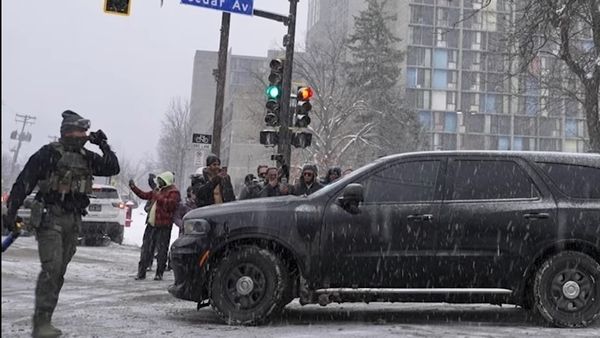French President Emmanuel Macron urged Europe to invest in its own collective security framework in the face of Russian military moves on the bloc’s doorstep. He also called for a “frank” EU dialogue with Russia in his address to the European Parliament on Wednesday at the start of France’s six-month rotating presidency of the European Council.
Macron said Europeans needed to build their own collective security pact and re-arm themselves after Russia prompted fears of a Ukraine invasion with a significant troop buildup on the border.
"Europe needs to finally build its own collective security framework on our continent," he told lawmakers in Strasbourg in eastern France.
"Security on our continent requires strategic rearmament," he said, adding that "frank and demanding" talks with Russia were also required.
At the heart of the framework would be principles agreed with Russia 30 years ago, Macron said – including rejecting the use of force or coercion, giving states the "choice to accede to alliances or bodies that they wish to" and the "rejection of spheres of influence".
"We, in Europe, need to stand up for these inherent rights," Macron said.
The EU was not involved in direct talks between the US and Moscow last week, which were aimed at soothing tensions caused by Russia's buildup of tens of thousands of troops on its border with Ukraine.
European defence is primarily assured by the US-led NATO military alliance, of which most EU states are members.
A proponent of the EU having its own "strategic autonomy" in defence, Macron added that the bloc must bring itself to a position to make sure "it can be respected", including by making sure it is not too dependent on Russia for its energy supplies.
UK migration policy responsible for Channel crisis
Addressing relations with Britain, which have been sorely tested in the months since Brexit, Macron said the EU must remain firm.
The situation of migrants risking their lives when trying to reach Britain by crossing the Channel from France in dinghies will not change as long as London does not adjust its migration policy, said Macron.
The French president also reiterated his view that Britain's migration system favours clandestine migration and does not allow for asylum seekers to seek legal ways into the country.
"Europe and the UK must find their way back to a point of confidence," he said, adding: "Let us be firm and clear so that commitments can be kept; this is the condition for being able to stay friends."
Macron said the EU must also rethink its relationships with western Balkan countries and the African continent, adding that France will organise a summit in February aimed at rebuilding partnerships between Europe and Africa.
Eye on re-election
Macron also said he would push to have the right to abortion and defence of the environment added to the EU's Charter of Fundamental Rights.
"We must update this charter to be more explicit on protection of the environment, [and] the recognition of the right to an abortion," Macron told lawmakers.
He conceded that growing inequality on the European continent meant that a new model was needed to meet climate and digital challenges, underlining the need to limit the power of internet giants.
After his speech Macron faced questions from MEPs, including France's Green party presidential challenger Yannick Jadot. Jadot excoriated Macron for his stance on refugees, blaming him for migrant deaths in the English Channel and for tearing down makeshift refugee encampments in and around the French capital.
Macron's speech elicited applause at several points – as did Jadot's.
The speech was, in part, designed to burnish Macron's international credentials as he faces re-election in April. Since he entered office in 2017, the French president has positioned himself as a pro-European leader in contrast to the nationalist and populist leanings of some of his political opponents.
(FRANCE 24 with AFP, AP and REUTERS)







